Nguni cattle are a popular meat breed, part of beef production in South Africa. Their name derives from the local tribes who historically farmed them, collectively known as the Nguni people.
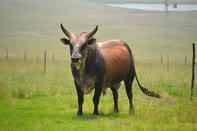
The cattle were originally spread across all the regions where these tribes settled, along the east coast of Southern Africa in places such as Swaziland, KwaZulu Natal, Mozambique and Zimbabwe, according to History and Background of the Nguni in South Africa, by Dr Michiel Scholtz, a scientist at the Agricultural Research Council’s Animal Production Unit at Irene.
Historically, these cattle were more than just a source of food and milk, but also reflected a person’s wealth, they were sometimes and still today, used to pay wedding dowries. People, in effect, tried to keep as many as possible, which led to overstocking and resulted in the notion that these cattle were poor performers.
When agricultural counsellors, however, introduced exotic breeds into these conditions, the breeds performed just as poorly or even worse than the Nguni, according to Dr Scholtz, whereas the Nguni’s performed better than initially expected under optimal conditions.
Attributes
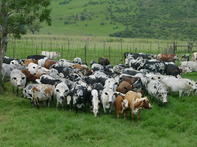
The Nguni is a medium breed framed animal, with cows weighing between 300 kg to 400 kg and bulls weighing between 500 kg to 600 kg. Nguni cattle have smooth coats with short hair that make it difficult for ticks to latch onto them.
Unlike the other breeds, hide colours, patterns and horn shapes are varied. The unique pigmentation on the hides not only protects them, from skin and eye cancer, but also turns their hides into a sought after by-product, used for making handbags, floor covers and wall art.
Over many years, the breed has adapted to the harsh environmental conditions of Southern Africa, making them quite heat, cold and disease resistant. Various studies have shown that they are the most tick resistant of all the cattle breeds farmed in South Africa, according to another of Dr Scholtz’s articles, Tick resistance in the Nguni Breed.
Nguni cattle have placid temperaments, making them easy to handle. Their growth rate is also comparable with that of the Afrikaner and Brahman, while feed conversion exceeds that of most other breeds. The Nguni Cattle Breeders Society, which was established in 1985, labels it as the breed that “produces the most kilogram of beef per hectare at the lowest cost,” making the Nguni “the most profitable and economically sustainable beef breed”.
Production Regions
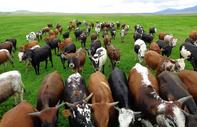
Nguni cattle are produced throughout South Africa thanks to their hardiness and ability to thrive on poor quality veld. The fact that it can tolerate high temperatures, bodes that it may play an increasingly important role in future meat production, especially with South Africa being predicted to have more extreme weather conditions due to climate change.
As an indigenous breed, Nguni cattle are a protected species and live animals may not be exported without a permit from the Registrar of Animals.
Use
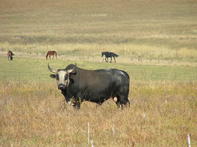
Nguni cattle are primarily a beef breed, but may also be used for dairy production and their skins are in high demand.
The breed may be produced on its own or used to enhance traits of other breeds, such as meat quality and maternal traits. The Nguni possesses excellent maternal traits, resulting in early sexual maturity, high reproduction rates, ease of calving and above average milk production. The dam line, for this reason, is used in various crossbreeding programmes.
Meat Quality
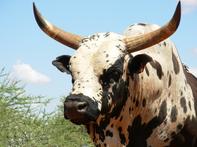
Nguni meat quality compares well with that of most other breeds, the colour of the meat is, however, generally darker, according to a study by the Department of Livestock and Pasture Science at the University of Fort Harare.
The hardiness of the breed means that it can be truly finished off the veld, without any hormones or growth stimulants. Finished off on the veld is a term used to explain that the cattle do not spend any time at a feeding lot.
For bulk or Nguni Beef export enquiries please use the enquiry link below.